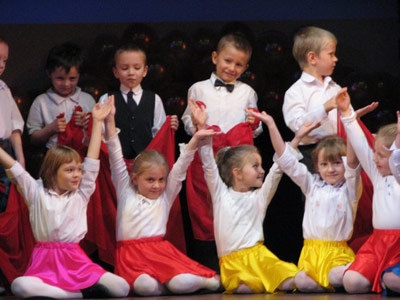Why did you decide to volunteer abroad with Global Volunteers in Poland?
Lori: That is still a good question that I have difficulty answering! Two things influenced me to choose that country. I had a great-grandmother who considered herself German when she came to the United States, but came from an area that is now present day Poland.
When I was a young university student someone from the United States simply couldn't go to Poland. One time while on a ferry between England and the Netherlands I met a woman from Poland and for years I felt badly about my lack of language skills and not being able to take advantage of the opportunity to learn about Poland.
Today the politics are different and my children have grown up so I now feel I have more free time. I am a public health nurse by profession and found the Global Volunteers principles consistent with my ideas about good public health work -- one doesn't come in and tell people what to do, but rather one works with communities to solve the problems of their concern and the solutions are developed together. The other principle that is important is the side by side work. Volunteers work with people from the community and the point of the work is actually to develop relationships between people; the work, while important, is secondary to creating the relationships.

Describe your day to day activities as a volunteer.
Lori: The day to day schedule varies by the program. The program always begins with at least a day of orientation. Volunteers review their understanding of the Global Volunteers principles. They articulate three personal goals for the experience and then use those personal goals to develop 3-4 team goals. For example, nearly always one team goal is to help children expand their English skills and another nearly always is to learn about Polish culture. Volunteers also articulate characteristics of a good team and this helps volunteers realize they are a team and not a group of disparate individuals each doing their own thing.
Monday-Friday are usually teaching days, although sometime Monday remains an orientation day, particularly if one is teaching in a school based program. A usual schedule is to teach about four hours. This may be an entire morning or will sometimes be divided between two hours in the morning and two hours in the afternoon. The remaining time is spent in planning the next day's activities. Some of the time during the day may be cultural activities with the students. I've participated in Mother's Day observances (also May 26th in Poland), gone on afternoon visits to a museum, attended "Polish night," a program given by students to help the volunteers learn more about Polish history and culture, gone to a "bonfire" with the Polish teachers with whom I've worked, gone with the students on a full-day field trip to a Polish National Park, or attended a piano recital given by music students from the University of Warsaw.
The weekend is free time. Volunteers can stay at the hotel as always or travel elsewhere in the country. The volunteer time nearly always ends with a final celebration of some sort. Students display their new English skills and everyone says farewell.
One unique aspect of the summer language camp is that the volunteers stay in the same lodging accommodations as the students. This provides many opportunities for informal conversations.
How has this experience impacted your future?
Lori: I am a university professor with a doctoral degree -- I'm done with academic education, but not as a professor yet. Personally, volunteering in Poland has been incredibly enriching. I have friends now in Poland and enjoy seeing messages arrive via e-mail or on Facebook. At a time in life when social contacts may be contracting, my life continues to expand.
Professionally, these experiences gave me good preparation for a Fulbright appointment at the University of Pecs in southern Hungary, where I spent six months in 2010. There I taught courses to doctoral students in the Faculty of Health Sciences, as well as help with university terms and English for Special Purpose classes. I have done a lot of conversational English teach before going to Hungary and developed a lot of skill for this. One of the nicest compliments I received came from one of the English teachers which whom I worked. She said, "Your walked in here and knew what you were doing."
Right now I'm teaching a Global Health Issues class and explain to students how communication and information technology changed in Poland from 2002-2011. I teach at a university which as many students who are immigrants or refugees. My experience with teaching conversational English helps me help these students.
I kept a blog while volunteering in Poland which you can visit at www.adventureshereandthere.blogspot.com. You will find entries in May 2011 and from late June to mid-August 2011 about my volunteer experience in Poland, as well as photos from that time. There are never enough volunteers for this program -- more students want to learn and expand their English skills than there are volunteers to help.